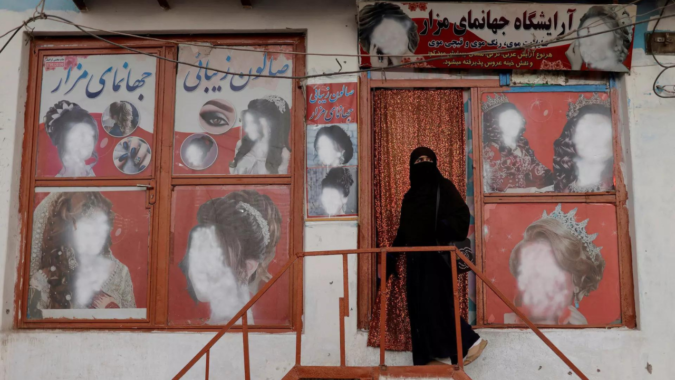ISLAMABAD: In the latest round of restrictions against women, Afghanistan’s Taliban-led government has imposed a ban on women-run beauty salons, depriving hundreds of female workers from employment as the war-battered country battles extreme poverty.
“All beauty salons operated by women in Kabul and other provinces should be banned immediately and follow our order,” the ministry of vice and virtue said in a text message on Tuesday, adding that they have one month, starting from July 2, to comply with the order. “Violators will face legal action,” warned Mohammad Sadeq Akif Muhajir, the ministry’s spokesman.
Before imposing a ban on beauty parlours, the Taliban had barred girls from schools, gyms, parks and swimming pools. Recently, they had even banned women from working for the United Nations. Earlier, the Taliban had ordered a strict dress code for women and restricted their movement, directing them not to travel without a male relative (mahram).
The restrictions have continued despite international condemnation and protests by women as well as activists speaking up on their behalf.
Shutting beauty salons was part of a wide range of measures imposed by the Taliban when they were last in power between 1996 and 2001. But they reopened in the years after the 2001 US-led invasion of Afghanistan and hundreds of beauty parlours were established across Kabul and other Afghan cities in the last two decades.
Human Rights Watch (HRW) has described Afghanistan as the most restrictive country in the world in terms of the rights of women and girls. According to HRW, women were being dismissed from all leadership posts and needed to be accompanied by a male guardian while travelling in most provinces of Afghanistan. “Women also do not have the right to most employment and are barred from working with international NGOs (except in health care, nutrition, and primary education),” it stated.
Reacting to the new closure, one Afghan woman told BBC that the Taliban were taking away the most basic human rights from Afghan women. “It seems the Taliban do not have any political plan other than focusing on women’s bodies. They are trying to eliminate women at every level of public life,” she said.
Kabul has not explained what prompted the ban, or what alternatives, if any, would be available to women once the salons shut.
“All beauty salons operated by women in Kabul and other provinces should be banned immediately and follow our order,” the ministry of vice and virtue said in a text message on Tuesday, adding that they have one month, starting from July 2, to comply with the order. “Violators will face legal action,” warned Mohammad Sadeq Akif Muhajir, the ministry’s spokesman.
Before imposing a ban on beauty parlours, the Taliban had barred girls from schools, gyms, parks and swimming pools. Recently, they had even banned women from working for the United Nations. Earlier, the Taliban had ordered a strict dress code for women and restricted their movement, directing them not to travel without a male relative (mahram).
The restrictions have continued despite international condemnation and protests by women as well as activists speaking up on their behalf.
Shutting beauty salons was part of a wide range of measures imposed by the Taliban when they were last in power between 1996 and 2001. But they reopened in the years after the 2001 US-led invasion of Afghanistan and hundreds of beauty parlours were established across Kabul and other Afghan cities in the last two decades.
Human Rights Watch (HRW) has described Afghanistan as the most restrictive country in the world in terms of the rights of women and girls. According to HRW, women were being dismissed from all leadership posts and needed to be accompanied by a male guardian while travelling in most provinces of Afghanistan. “Women also do not have the right to most employment and are barred from working with international NGOs (except in health care, nutrition, and primary education),” it stated.
Reacting to the new closure, one Afghan woman told BBC that the Taliban were taking away the most basic human rights from Afghan women. “It seems the Taliban do not have any political plan other than focusing on women’s bodies. They are trying to eliminate women at every level of public life,” she said.
Kabul has not explained what prompted the ban, or what alternatives, if any, would be available to women once the salons shut.
